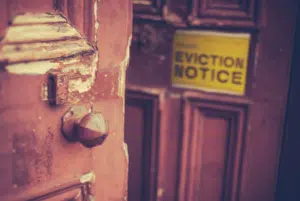One of the most aggravating experiences in probate is dealing with someone who stubbornly refuses to leave the estate home. This person could be an heir or, in some cases, the personal representative who lived with the deceased before death. Thus, a question pops up: “Can an heir living on the property be evicted?”
Situations like these can complicate matters, delay the progress of the probate, and even lead to additional legal fees.
If you’re feeling unsure of what to do, it’s a good idea to understand your rights and legal options. An experienced probate attorney can provide guidance and help you protect the estate’s assets.

Below are two possible scenarios.
If someone else is listed on the deed, the property may either have a Joint Tenants with Rights of Survivorship (JTWROS) or Tenants-in-Common (TIC) title.
With a JTWROS title, the ownership automatically transfers to the surviving owner/s when a co-owner dies.
On the other hand, if the property has a TIC title, it becomes part of the deceased’s estate and goes through probate. This process will determine how it will be passed on to heirs and beneficiaries.
It’s important to remember that the default way for multiple people to own a property together is through Tenants-In-Common. So, unless the deed specifies that it is JTWROS, the real estate might be considered TIC.
When no one else is listed in the deed, the decedent is seen as the sole owner of the property.
Once the Probate Court accepts the will, the executor named in the will (if there is one) can decide on estate property matters. On the other hand, when there is no will, family members will need to nominate an administrator.
Once the court appoints an administrator, that person will gain the authority to handle how the property is passed on to heirs and beneficiaries.

However, if there are outstanding creditors, the personal representative will use the estate’s assets — not just money — to pay off as much debt as possible. If the estate does not have enough assets to cover the debts, the executor may need to sell the home to satisfy those creditors.
As a rule, all creditors must be satisfied correctly before any assets, including the home, are distributed to the beneficiaries.
If an heir refuses to leave the estate home because they believe they have inherited it, the appointed executor can take steps to attempt to have them evicted.
Without a will, the estate administrator would be in charge of the decedent’s estate. Once the court appoints them, they will be legally responsible for the estate’s property affairs.
When someone refuses to leave the estate home, the administrator would have the legal duty to seek court intervention. That means they can ask to have that person removed from the property.

The eviction process, however, does not happen in probate court. Instead, either the magistrate’s court or superior court oversees it, depending on the county where the property is located.
Considering evicting someone who refuses to leave the estate home or with a beneficiary refusing to leave the property can be complicated. If you are experiencing this, we recommend contacting our office to discuss your situation.
If some heirs want to keep the inherited home while others want to sell it, the decision on what to do may depend on whether or not there is a will.
If there is a will, the court will appoint an executor who must first settle all the outstanding debts before transferring any property. The executor may need to sell the property if there are not enough assets to satisfy what the estate owes.
Assuming the property remains after the executor paid all the creditors, here are the possible scenarios:
If there is no will, the Probate Court will appoint an administrator who will distribute whatever remains from the estate after paying all outstanding creditors.
With the property intact, whoever wishes to keep the property can buy the shares of the other heirs.
When heirs cannot agree on a fair market price, selling the property might be the best option, as they can split the proceeds evenly.

They should remain impartial and never favor their own interests at the expense of the heirs and beneficiaries. They owe specific duties to the estate, including acting in good faith, collecting estate assets, paying estate taxes and debts, and preserving assets for the benefit of the beneficiaries.
If an executor or administrator intentionally sells real estate at a lower price than reasonable, it is a violation of their fiduciary duty. You can respond by requesting information about the property’s appraisal.
If you are in this situation, you also have two options:
Attempt to request information about the property’s appraisal and find out the reason behind the lower sale price.
The court can take certain steps, including removing the executor or administrator from their position.
These types of situations can be very complex, so we highly recommend asking a competent probate lawyer to represent you. They can help you ensure that the executor or administrator is acting in the best interests of the beneficiaries.
Ideally, selling the estate below market price by a personal representative should not happen. But if it does and their action results in financial loss, the court may hold them personally responsible, especially if they have exploited their position.
If the court finds that the executor or administrator violated their fiduciary duties, the court may remove them from their position. However, only a severe and damaging action by the personal representative can warrant removal.
Keep in mind that several factors can also influence the property’s value, and the executor may have valid reasons for selling it at a lower price. So, consult a probate attorney before acting on your assumptions.
Handling a loved one’s estate, especially if it’s your parent’s estate, can be a difficult and emotional process, especially when disagreements arise among family members. It is important to keep your emotions in check to prevent damaging relationships with your loved ones.
Consulting a probate lawyer can help you navigate the complexities of the probate process, protect your interests and guide you on how can an heir living on the property be evicted. Give us a call at (770) 796-4271 to schedule a consultation to discuss your situation.
Disclaimer These websites have not been reviewed by Georgia Probate Law Group and are not endorsed or even recommended by Georgia Probate Law Group. These websites are additional resources that you can use to further your general education on this topic.
Disclaimer: The information above is provided for general information only and should not be considered legal advice. Our probate attorneys provide legal advice to our clients after talking about the specific circumstances of the client’s situation. Our law firm cannot give you legal advice unless we understand your situation by talking with you. Please contact our law office to receive specific information about your situation.
Compassionate listeners, knowledgeable guidance. Schedule a free consultation with our team and let us help you and your family with your legal concerns.
GET IN TOUCH 770-796-4685Learn Important Probate Essentials, including key things that go wrong in an estate, how to prevent them, and what to do if they happen.



© 2025 Georgia Probate Law Group by Broel Law, LLC. All rights reserved.